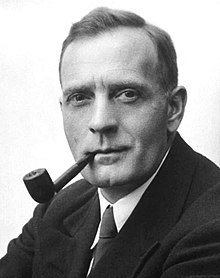Edwin Hubble
American astronomer (1889–1953)
Edwin Powell Hubble (November 20, 1889 – September 28, 1953) was an American astronomer. He profoundly changed our understanding of the universe by demonstrating the existence of other galaxies besides the Milky Way. He also discovered that the degree of redshift observed in light coming from a galaxy increased in proportion to the distance of that galaxy from the Milky Way. This became known as Hubble's law, and would help establish that the known universe is expanding.

Quotes
edit- Equipped with his five senses, man explores the universe around him and calls the adventure Science.
- Hubble, Edwin (May 1929). "The Exploration of Space". Harper's Magazine 158: 732.
- Science is the one human activity that is truly progressive.
- The Realm of the Nebulae (1936)
- Eventually, we reach the utmost limits of our telescopes. There, we measure shadows and search among ghostly errors of measurement for landmarks that are scarcely more substantial.
- The Realm of the Nebulae (1936)
- The history of astronomy is a history of receding horizons.
- The Realm of the Nebulae (1936)
- ...there must be no favored location in the universe, no center, no boundary; all must see the universe alike. And, in order to ensure this situation, the cosmologist postulates spatial isotropy and spatial homogeneity.
- The Observational Approach to Cosmology, 1937, p. 63
- The whole thing is so much bigger than I am, and I can't understand it, so I just trust myself to it; and forget about it.
- Hubble's reply when asked about his beliefs from a friend, as quoted in Edwin Hubble: Mariner of the Nebulae (1996) by Gale E. Christianson, p. 183.
- "We do not know why we are born into the world, but we can try to find out what sort of a world it is — at least in its physical aspects."
- Quoted in Edwin Hubble: Mariner of the Nebulae (1996) by Gale E. Christianson, p. 183.
- She deserved the Nobel Prize for her work.
- Often said by Hubble about Henrietta Swan Leavitt.
Attributed
edit- I chucked the law for astronomy, and I knew that even if I were second-rate or third-rate, it was astronomy that mattered.
- as quoted by N. Y. Mayall (1970). Biographical memoir. Volume 41, Memoirs of the National Academy of sciences, National Academy of Sciences (U.S.). National Academy of Sciences. p. 179.
Quotes about Hubble
edit- If the apparent magnitudes of the nebulae are corrected merely for the effect of the red-shift in diminishing the energy of their observed light, we have seen that Hubble claims that the system is uniformly spread out in space. If, however, the nebulae are receding, an additional dimming factor arises, and the corresponding correction for distance when incorporated in the calculation destroys the homogeneity. Instead, the number of nebulae per unit volume of space now appears to increase as we recede towards the confines of the visible universe. Rightly or wrongly, Hubble maintains that such a picture would imply that we were in a privileged position in the universe, being in the region lease densely populated with nebulae. On these, and other grounds, he is inclined, therefore, to reject the Doppler-interpretation of the red-shifts and to regard the nebulae as stationary.
- Gerald James Whitrow, The Structure of the Universe: An Introduction to Cosmology (1949)